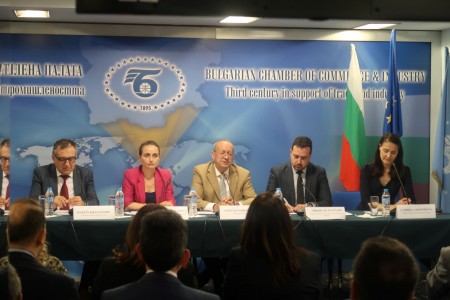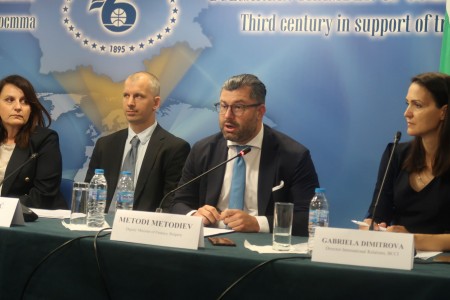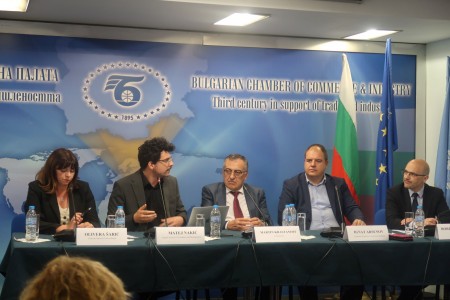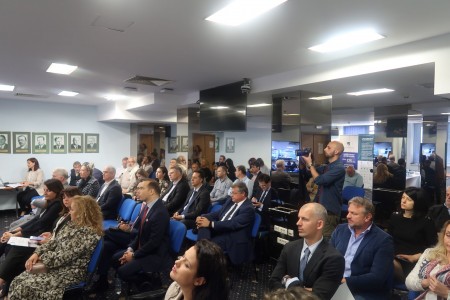Bulgaria's experience with the Bulgarian currency board will contribute to our country being among the most disciplined member countries of the eurozone, said Tsvetan Simeonov, President of the Bulgarian Chamber of Commerce and Industry at the opening of the conference "Introduction of the euro - risks and challenges. Croatia's experience" . The event is organized together with the Bulgarian-Croatian Business Club and in cooperation with the head of the Office for Trade and Economic Affairs of Bulgaria in Zagreb, Mirela Taseva.
The analyzes and studies of the BCCI show that most of the countries have adopted the euro successfully and do not report a significant rise in inflation, Simeonov also said. He recalled what happened to the countries of the second wave of expansion of the Economic and Monetary Union (EMU), with Austria, Ireland, etc. countries where there is a reported increase in consumer prices in the year before actual membership, their decline in the year of accession and higher inflation in the year after their membership of the euro area.
Bulgaria must make precise analyses, although the introduction of the euro is not among the most important factors for higher inflation. The experience of our neighboring countries in the pre-accession stage was described.
The BCCI supports all efforts towards the accession of Bulgaria to the EMU, Simeonov recalled, because both business and society will benefit from the deepening of the country's integration with EU structures.
The conference proceeded with a lively discussion about the risks and challenges that await our country with the adoption of the euro.
Nikolay Pavlov, Deputy Minister of Economy and Industry indicated that Bulgaria's membership is among Bulgaria's most significant foreign policy priorities, along with Schengen and the Organization for Economic Cooperation and Development (OECD). The experience of Croatia for Bulgaria in the process of joining the Eurozone is very valuable, Pavlov added. According to him, it is important for our country to be a part of European integration, of a community uniting over 340 million Europeans from 20 countries, and hence - to be among the factors involved in the decision-making process.
„Consumers, their rights and guaranteeing them with Bulgaria's accession to the Eurozone is a priority for the administration of the Ministry of Economy and Industry,“ said Deputy Minister Nikolay Pavlov. In the draft Law on the introduction of the euro, he pointed out, there are provisions in this direction, which are completely mandatory for implementation in the transitional period of the introduction of the euro in the country. We are talking about the indicated period for double indication of prices in BGN and in Euro. In line with consumer protection, he mentioned that a price verification campaign is planned during the period of introduction of the euro and in the period after.
During the preparations for Bulgaria's accession, the balance between the interests of business and consumers is sought, added the deputy minister.
Metodi Metodiev, Deputy Minister of Finance, stated that there are all prerequisites for the Law on the introduction of the euro to be considered and voted on by the National Assembly by the end of the summer. It has been in preparation for the past year and a half. For its preparation, experience was drawn from Croatia.
In line with inflation, the Deputy Minister of Finance said that the models of the Ministry of Finance show that Bulgaria will cover this criterion by the end of the year. The latest data on inflation confirm the downward trend, but the decrease is not yet sufficient, Metodiev pointed out. He reaffirmed that Bulgaria can request an extraordinary convergence report as soon as it has met all the nominal criteria for eurozone membership. Inflation is currently the only criterion that the country does not meet.
Yordanka Chobanova, head of the EC Representation in Bulgaria announced that the European Commission (EC) is cooperating very closely with the Bulgarian authorities to prepare the introduction of the euro in the country. The next critical step is the communication strategy and action plan, which should take into account all possible risks and challenges surrounding the process. Chobanova also drew attention to the fears in society, most of which are groundless and can be overcome.
Economic and Monetary Union is the greatest success of European integration and a symbol of our growing political unity. It is a mixture of political symbolism, of deepening integration, including deepening economic interconnectedness.
As part of the Eurozone, Bulgaria will also become a member of one of the most important currencies in the world. In addition, our country "will be at the table" where decisions are made by the European Central Bank (ECB) on monetary policy, and its voice will be counted when shaping the economic future of the region.
Significant benefits are expected from the membership of the Eurozone for Bulgarian business, arising from the elimination of currency exchange costs, transaction costs, there will also be access to capital and external investments with access to the integrated financial market. The currency risk will also disappear, Chobanova said.
Representatives of Croatian financial institutions reviewed the legislative framework in their country for the introduction of the euro during the conference.
Mislav Burkic, Chief Advisor in the Directorate for European Affairs at the National Bank of Croatia, said that the transition period for the introduction of the euro was 2 weeks for them, during which time people had the opportunity to pay in cash as well as in kuna (the national currency until January 1, 2023) and in euros. Cashless payments were no longer possible in kuna, as from January 1 all bank accounts were converted into euros.
"Businesses had to exchange kunas into euros before January 1 to start working with euros from day one - in the two-week transition period they accepted kunas but returned change in euros. Everyone managed, only some small businesses failed and they also returned change in kuna, but after the end of the transition period, everything went back to normal," Berkic pointed out.
Inflation in Croatia in 2023, the year the country entered the eurozone, was 8.4 percent, while in Bulgaria and other countries it was higher, so it cannot be said that Croatia was in -vulnerable position with respect to inflation. Without the adoption of the euro, inflation would have been 8 or 8.2 percent, according to Burkic. He expects fewer challenges in this regard for Bulgaria, because inflation has calmed down at the moment.
Checks on price gouging since the introduction of the euro have also been important for Croatia. The country has campaigned for a code of ethics, in which companies commit to following certain rules and not raising prices. Participating companies have been given a sticker to display in a prominent place to let customers know that traders follow the code of ethics and prices are converted correctly.
According to Berkić, some of the advantages are apparent immediately after the adoption of the euro, such as in relation to foreign debts in euros. In addition, with the introduction of the euro, the country becomes more secure for trading partners and has a positive effect on tourism.
Ana Blekic, a representative of the National Revenue Agency of Croatia, said that preparations for the introduction of the euro in their country started in 2021. It took place in 3 phases - in the first phase, the amounts in both currencies were displayed in their system , with the euro being informative only, the second phase started on January 1, 2023, continuing to display both currencies, but the Kuna being informative. From January 1, 2024, the amounts in their system are only in euros.
Blekić explained that the smooth introduction of the euro went along two lines – on the one hand, the Ministry of Economy, which was supposed to guide the business, and on the other, the Ministry of Finance, which was responsible for another part of the issues.
According to Goran Šaravanja, Chief Economist at the Croatian Chamber of Commerce, the country overcame the challenges of introducing the euro because it had the right coordination between the central bank and ministries.
Sharavania emphasized that the introduction of the euro had only a positive impact on the business environment. In the beginning, businesses had higher costs because of the currency exchange, but now there are lower fees, which makes up for it, Sharavania explained. He added that the Croatian economy is one of the fastest growing and one of the reasons for this is the adoption of the euro.
Anja Haramija, general partner at law firm Peterka & Partners, pointed out that much of the Croatian laws that mentioned kunas needed to be amended. These laws were divided into two groups - some were to be revised before the entry of the euro, and others after.
After the introduction of the euro in Croatia, all legal provisions remained in force, without the need to amend them - the amounts in them were exchanged in euros at the current exchange rate.
Haramia recommended that companies familiarize themselves with the documentation for the introduction of the euro as soon as possible and start a harmonization process, after the introduction of the euro to go through all their accounts to make sure that they are exchanged correctly. For companies that work with cash on a daily basis, she also recommended exchanging a larger amount in euros to keep operations running smoothly. As well as train their employees to execute annexes and future contracts only in euros. "My final advice is to always seek legal help if something is unclear," concluded Haramia.
One of the most important topics in the introduction of the euro is consumer consultation, said Ignat Arsenov, representative of the Consumer Protection Commission (CCP), during the conference. According to him, the introduction of the euro requires significant efforts to protect consumers in order to ensure a smooth transition from the lev to the euro and to prevent potential abuses in the market.
He noted several key aspects, the first of which is information and education. "We know that information is the most important part. It will be provided through campaigns in order to inform users about the upcoming changes and the whole process," comments Arsenov. He specified that their campaigns include brochures, websites, social networks, but also traditional media such as television and radio.
Users must receive information about both prices - in euros and leva - one month after the council's decision and 12 months after the introduction of the euro. In the first month of the introduction of the new currency, users will be able to pay in both currencies.
According to him, measures against inflation and speculation are also foreseen, which include price monitoring, especially of the most important prices and services, and information will be given to consumers about price changes and reports on these changes will be published.
Arsenov pointed out that another aspect of their work will be regulations and control. The exchange rate will be fixed so they will check the prices to match it. Measures are also being taken to strengthen regulatory bodies, to support advisory services.
There will be a special option for user complaints on the euro website, which will be responded to very quickly. Arsenov added that they also provide for training and information measures for both traders and consumers.
Matej Nakic of the Zagreb School of Economics and Management pointed out that the consumer is irrational in the market, citing research that found that people in Croatia began to spend more money after the introduction of the euro, especially on cheap, everyday products, because the number - a little in euros than in kunas.



